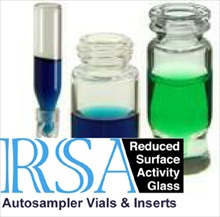Channels
Special Offers & Promotions
RSA Glass
A next generation of glass reduces the interaction of analytes and the glass
 Detect low abundance analytes normally adsorbed by glass
Detect low abundance analytes normally adsorbed by glass- Prevent pH changes in vials before injection
- Prevent hydrolysis that can occur in your vials
- Exhibits no meniscus when water is used as the main solvent
RSA glass vials are not coated or silanized – they are produced by a revolutionary new patent pending production process that eliminates virtually all silanols (hydroxyl groups)
Made with a new patent pending, glass manufacturing process, RSA Glass vials and inserts have reduced surface activity for basic compounds. This is due to the elimination of virtually all silanols (hydroxyl groups) that can have deleterious effects on your analytes and sample solutions. This lack of surface silanols makes RSA Glass vials an excellent choice for many applications. With standard borosilicate glass vials and inserts sample diluents (such as water) can de-protonate the many surface hydroxyl groups, producing a negative charge on the glass wall. The “acidic” functionality of silanols has been known to cause adsorption of basic compounds, change the sample solution pH and/or hydrolyze susceptible compounds rendering them undetectable. With RSA Glass vials and inserts there is virtually no sample “loss to the vial” and no “pH shifting” making your analysis more reliable.
If you are working with low abundance basic samples with regular glass vials, it is very possible that your compounds could easily be adsorbed to the glass wall. This can change your quantitation or completely remove the compound from solution preventing injection and ultimately masking its detection and identification. With RSA Glass vials and inserts this will not occur if the adsorption is due to silanol interaction.
If you are working with sensitive compounds commonly found in natural products, biological samples or chemical synthesis, the glass wall could be a problem for basic compounds. With RSA Glass vials this problem is eliminated.
If you are working with basic proteins that adsorb or are affected by silanols, RSA Glass vials and inserts will be a good solution for you. If your proteins are sticking to the glass due to adsorption to the siloxane surface, RSA Glass provides an almost completely silanized surface, which is far superior to standard borosilicate glass for protein and peptide analysis.
RSA Glass has been tested for metals that may cause sample or diluent contamination. It has ULTRA low levels of sodium, calcium, aluminium and boron. Sodium and boron levels are 200 to 300 times less concentrated compared to leading manufacturers, with calcium and aluminium almost non-detectable. Testing was done with ICP using water from the vials which had had a 4 hour "soak" time.
Make your analysis more reliable, lot to lot, run to run and day to day and avoid the frustration of unreliable data.
Adsorption and pH data
For further information on RSA Glass vials please contact authorised distributor Hichrom Limited on Tel: +44 (0)118 930 3660 or e-mail: technical@hichrom.co.uk or visit www.microsolvtech.com/rsa_glass2.asp
Media Partners


